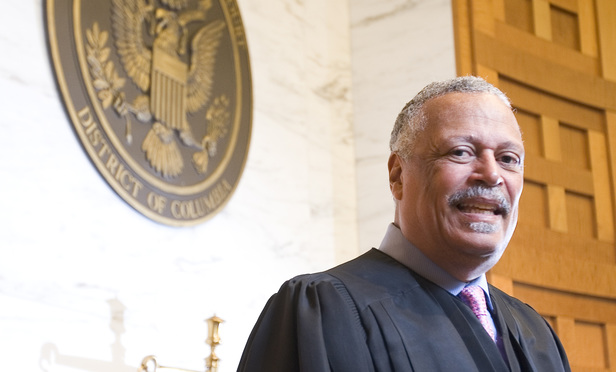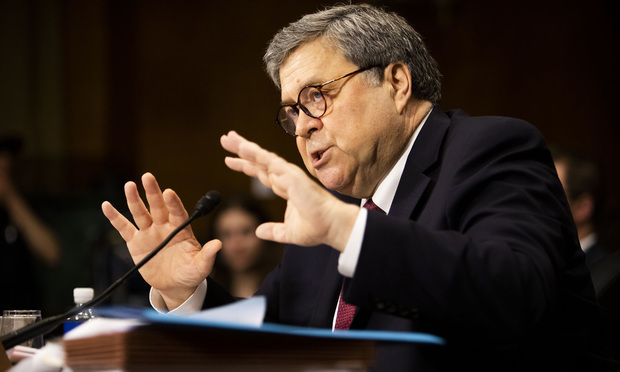Thousands of Ex-Prosecutors Urge Flynn Judge to Question Barr's Move to Drop Case
"Prosecutors must make decisions based on facts and law, not on the defendant's political connections," former prosecutors said in an open letter posted Monday.
May 11, 2020 at 01:51 PM
5 minute read
The original version of this story was published on National Law Journal
 Judge Emmet Sullivan of the U.S. District Court for D.C. May 27, 2009. Photo: Diego M. Radzinschi/ALM.
Judge Emmet Sullivan of the U.S. District Court for D.C. May 27, 2009. Photo: Diego M. Radzinschi/ALM.
Nearly two thousand former Justice Department officials on Monday urged a Washington judge to closely examine U.S. Attorney General William Barr's move to drop the prosecution of Michael Flynn, the former Trump national security adviser who twice pleaded guilty to lying to federal agents in the Russia investigation.
In an open letter, the former Justice Department officials from past Republican and Democratic administrations condemned the recent maneuvering in Flynn's case as a political favor for a friend of President Donald Trump and called on U.S. District Judge Emmet Sullivan of the District of Columbia to consider rejecting the motion to dismiss the prosecution and "proceed with sentencing if appropriate."
Sullivan has yet to give any public indication of how he will respond to the Justice Department's abandonment of Flynn's case, but many expect him to at least hold a hearing to question the reasoning for the move.
"While it is rare for a court to deny the department's request to dismiss an indictment, if ever there were a case where the public interest counseled the court to take a long, hard look at the government's explanation and the evidence, it is this one," the former Justice Department officials wrote. "Attorney General Barr's repeated actions to use the department as a tool to further President Trump's personal and political interests have undermined any claim to the deference that courts usually apply to the department's decisions about whether or not to prosecute a case."
Barr has strongly defended his Justice Department's move to end the Flynn case. Speaking with CBS news last week, Barr said a "fair history would say that it was a good decision because it upheld the rule of law. It helped, it upheld the standards of the Department of Justice, and it undid what was an injustice."
For many of the former federal prosecutors and other DOJ officials, the letter represented what in recent months has become a familiar exercise in protest. In February, many of them attached their names to a similar letter assailing Barr over his intervention in the case of Roger Stone, in which the attorney general overruled the sentencing recommendation of career prosecutors to suggest a shorter prison term for Trump's longtime friend.
With his move to dismiss the Flynn case, Barr has now "once again assaulted the rule of law," the former Justice Department lawyers said in their new letter.
"Make no mistake: The department's action is extraordinary rare, if not unprecedented. If any of us, or anyone reading this statement who is not a friend of the president, were to lie to federal investigators in the course of a properly predicated counterintelligence investigation, and admit we did so under oath, we would be prosecuted for it," the former DOJ officials added.
 Attorney General William Barr testifies before the Senate Judiciary Committee on May 1. Photo: Diego M. Radzinschi / NLJ
Attorney General William Barr testifies before the Senate Judiciary Committee on May 1. Photo: Diego M. Radzinschi / NLJThe Justice Department, in its motion to dismiss, based the decision to drop Flynn's case on the argument that his lies to federal agents were not "material." The filing was signed only by the interim U.S. attorney in Washington, Timothy Shea, who previously served as a close aide to Barr.
The move to dismiss Flynn's case was foreshadowed by the withdrawal of Brandon Van Grack, a career prosecutor who served on special counsel Robert Mueller III's team and played a lead role negotiating the former national security adviser's plea deal in 2017. Barr's intervention in the Stone sentencing similarly coincided with career prosecutors dropping off the case. Another prosecutor, Jonathan Kravis, resigned from the Justice Department.
On Monday, Kravis joined in the growing criticism of the Justice Department's abandonment of Flynn's case. In a Washington Post op-ed, Kravis drew a parallel between the prosecutions of Stone and Flynn.
"In both cases, the department undercut the work of career employees to protect an ally of the president, an abdication of the commitment to equal justice under the law," wrote Kravis, who has since joined the District of Columbia attorney general's office in a three-month consulting role.
"Prosecutors must make decisions based on facts and law, not on the defendant's political connections. When the department takes steps that it would never take in any other case to protect an ally of the president, it betrays this principle."
Read more:
'A Pardon by Another Name': Lawyers Decry Barr's Move to Dump Flynn Case
'When Character Matters Most': Lawyers Defend Stone Prosecutors Who Quit
'Loss to the Pursuit of Justice': Praise for Roger Stone Prosecutor Who Resigned
'A Very Difficult Time': Challenges for Career Lawyers at Trump's DOJ
'Slammed': What Has Driven Departures From Trump's Justice Department
Women Lawyers' Group Stands Up for Jessie Liu After DOJ Nomination Scuttled
This content has been archived. It is available through our partners, LexisNexis® and Bloomberg Law.
To view this content, please continue to their sites.
Not a Lexis Subscriber?
Subscribe Now
Not a Bloomberg Law Subscriber?
Subscribe Now
NOT FOR REPRINT
© 2025 ALM Global, LLC, All Rights Reserved. Request academic re-use from www.copyright.com. All other uses, submit a request to [email protected]. For more information visit Asset & Logo Licensing.
You Might Like
View All
Skadden and Steptoe, Defending Amex GBT, Blasts Biden DOJ's Antitrust Lawsuit Over Merger Proposal
4 minute read
'Lack of Independence' or 'Tethered to the Law'? Witnesses Speak on Bondi
4 minute read
Trending Stories
- 1'A Death Sentence for TikTok'?: Litigators and Experts Weigh Impact of Potential Ban on Creators and Data Privacy
- 2Bribery Case Against Former Lt. Gov. Brian Benjamin Is Dropped
- 3‘Extremely Disturbing’: AI Firms Face Class Action by ‘Taskers’ Exposed to Traumatic Content
- 4State Appeals Court Revives BraunHagey Lawsuit Alleging $4.2M Unlawful Wire to China
- 5Invoking Trump, AG Bonta Reminds Lawyers of Duties to Noncitizens in Plea Dealing
Who Got The Work
J. Brugh Lower of Gibbons has entered an appearance for industrial equipment supplier Devco Corporation in a pending trademark infringement lawsuit. The suit, accusing the defendant of selling knock-off Graco products, was filed Dec. 18 in New Jersey District Court by Rivkin Radler on behalf of Graco Inc. and Graco Minnesota. The case, assigned to U.S. District Judge Zahid N. Quraishi, is 3:24-cv-11294, Graco Inc. et al v. Devco Corporation.
Who Got The Work
Rebecca Maller-Stein and Kent A. Yalowitz of Arnold & Porter Kaye Scholer have entered their appearances for Hanaco Venture Capital and its executives, Lior Prosor and David Frankel, in a pending securities lawsuit. The action, filed on Dec. 24 in New York Southern District Court by Zell, Aron & Co. on behalf of Goldeneye Advisors, accuses the defendants of negligently and fraudulently managing the plaintiff's $1 million investment. The case, assigned to U.S. District Judge Vernon S. Broderick, is 1:24-cv-09918, Goldeneye Advisors, LLC v. Hanaco Venture Capital, Ltd. et al.
Who Got The Work
Attorneys from A&O Shearman has stepped in as defense counsel for Toronto-Dominion Bank and other defendants in a pending securities class action. The suit, filed Dec. 11 in New York Southern District Court by Bleichmar Fonti & Auld, accuses the defendants of concealing the bank's 'pervasive' deficiencies in regards to its compliance with the Bank Secrecy Act and the quality of its anti-money laundering controls. The case, assigned to U.S. District Judge Arun Subramanian, is 1:24-cv-09445, Gonzalez v. The Toronto-Dominion Bank et al.
Who Got The Work
Crown Castle International, a Pennsylvania company providing shared communications infrastructure, has turned to Luke D. Wolf of Gordon Rees Scully Mansukhani to fend off a pending breach-of-contract lawsuit. The court action, filed Nov. 25 in Michigan Eastern District Court by Hooper Hathaway PC on behalf of The Town Residences LLC, accuses Crown Castle of failing to transfer approximately $30,000 in utility payments from T-Mobile in breach of a roof-top lease and assignment agreement. The case, assigned to U.S. District Judge Susan K. Declercq, is 2:24-cv-13131, The Town Residences LLC v. T-Mobile US, Inc. et al.
Who Got The Work
Wilfred P. Coronato and Daniel M. Schwartz of McCarter & English have stepped in as defense counsel to Electrolux Home Products Inc. in a pending product liability lawsuit. The court action, filed Nov. 26 in New York Eastern District Court by Poulos Lopiccolo PC and Nagel Rice LLP on behalf of David Stern, alleges that the defendant's refrigerators’ drawers and shelving repeatedly break and fall apart within months after purchase. The case, assigned to U.S. District Judge Joan M. Azrack, is 2:24-cv-08204, Stern v. Electrolux Home Products, Inc.
Featured Firms
Law Offices of Gary Martin Hays & Associates, P.C.
(470) 294-1674
Law Offices of Mark E. Salomone
(857) 444-6468
Smith & Hassler
(713) 739-1250









